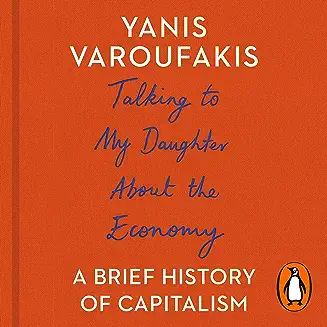
In the book, Varoufakis provides an engaging and insightful overview of the history of capitalism, tracing its origins and evolution from ancient times to the modern era. He delves into the key economic ideas and theories that have shaped the world we live in, including the role of markets, money, and finance.
Varoufakis also highlights the inherent flaws and inequalities within the capitalist system and discusses how these issues have contributed to various economic crises throughout history. He addresses contemporary challenges, such as the increasing wealth gap and the impact of globalization, offering his perspectives on potential solutions and alternatives for a more equitable economic future.
Overall, “Talking to My Daughter About the Economy” presents a captivating and approachable exploration of the complex world of economics, making it accessible to readers who may not have a background in the subject while encouraging critical thinking about the current economic system and its implications for society.
Key concepts and ideas.
- Capitalism’s Historical Development: The book provides a historical overview of how capitalism evolved over time. It traces its roots back to ancient civilizations, through feudalism and mercantilism, to the industrial revolution and the emergence of modern capitalist societies.
- The Role of Markets and Money: Varoufakis explains the significance of markets in capitalist economies as mechanisms for the exchange of goods and services. He also discusses the importance of money as a means of facilitating these exchanges and its role in shaping economic activities.
- Invisible Hand and Self-Interest: The book explores Adam Smith’s concept of the “invisible hand,” the idea that individuals pursuing their self-interest in a competitive market can unintentionally benefit society as a whole.
- The Division of Labour and Productivity: Varoufakis discusses how the division of labor and specialization in capitalist economies have contributed to increased productivity and economic growth.
- Capital and Surplus Value: The author delves into the concept of capital and how surplus value is generated in capitalist systems through the exploitation of labor, often leading to income inequality.
- The Great Depression and Economic Crises: The book examines historical economic crises, including the Great Depression of the 1930s, to illustrate the inherent instabilities and vulnerabilities of capitalist economies.
- Globalization and Financialization: Varoufakis explores the impacts of globalization and financialization on economies worldwide, emphasizing how these processes have transformed the nature of capitalism in recent decades.
- Income Inequality and Wealth Concentration: The book addresses the growing issue of income inequality and the concentration of wealth among a small segment of the population, which can have detrimental effects on social cohesion and economic stability.
- The Role of Governments: The author discusses the role of governments in managing capitalist economies, including their responsibilities for regulation, social welfare, and addressing market failures.
- Alternatives and Proposals: Throughout the book, Varoufakis presents alternative economic ideas and policies that aim to address the shortcomings of capitalism and promote a fairer and more sustainable economic system.
- Economic Democracy: One of the core themes is the notion of “economic democracy,” which involves giving citizens a more direct say in economic decisions that affect their lives, rather than leaving these choices exclusively to market forces and corporations.
- Social Responsibility and Solidarity: The book promotes the idea of fostering a sense of social responsibility and solidarity among individuals and societies, aiming for a more compassionate and just economic order.
Overall, “Talking to My Daughter About the Economy” presents a comprehensive exploration of capitalism and its historical development, offering readers an engaging and thought-provoking perspective on the complex world of economics and its impact on society.
